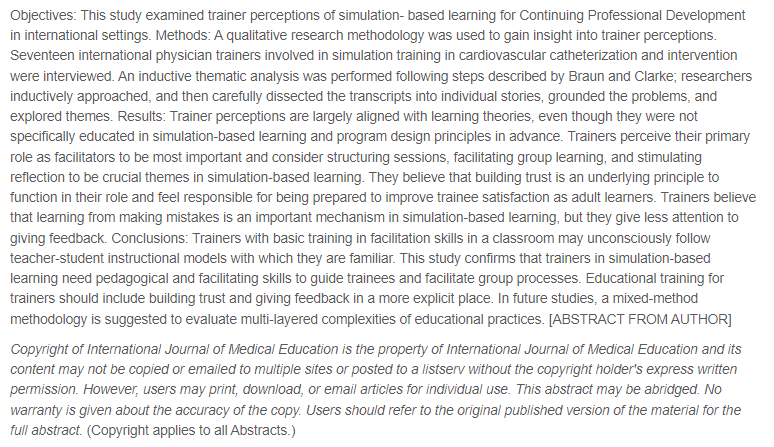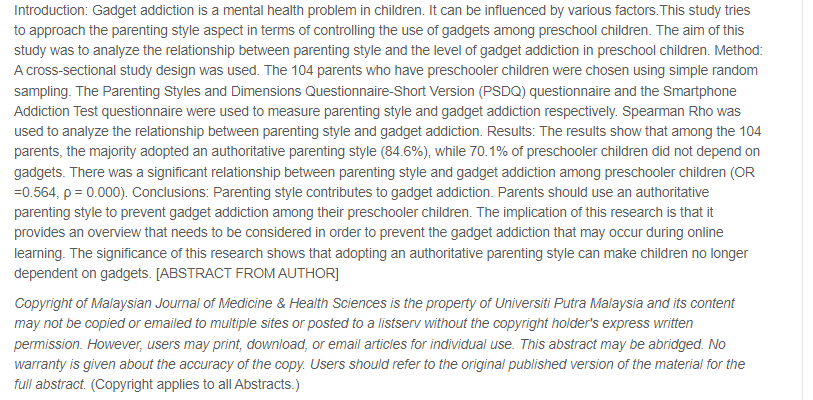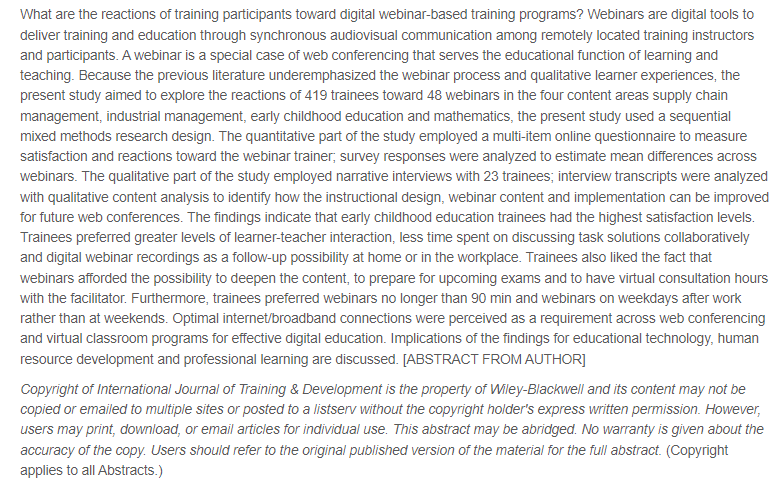
article 1

articles 2

article 3

Q.3.1 For each article, discuss how the researchers would have ensured trustworthiness (15) and/ or reliability and validity when conducting the research. Your answer can be a combination of examples from the articles and theory from various sources. Q.3.2 Critically discuss the ethical issues the researchers can be expected to have (15) considered before, during and after the research process. Objectives: This study examined trainer perceptions of simulation- based learning for Continuing Professional Development in international settings. Methods: A qualitative research methodology was used to gain insight into trainer perceptions. Seventeen international physician trainers involved in simulation training in cardiovascular catheterization and intervention were interviewed. An inductive thematic analysis was performed following steps described by Braun and Clarke; researchers inductively approached, and then carefully dissected the transcripts into individual stories, grounded the problems, and explored themes. Results: Trainer perceptions are largely aligned with learning theories, even though they were not specifically educated in simulation-based learning and program design principles in advance. Trainers perceive their primary role as facilitators to be most important and consider structuring sessions, facilitating group learning, and stimulating reflection to be crucial themes in simulation-based learning. They believe that building trust is an underlying principle to function in their role and feel responsible for being prepared to improve trainee satisfaction as adult learners. Trainers believe that learning from making mistakes is an important mechanism in simulation-based learning, but they give less attention to giving feedback. Conclusions: Trainers with basic training in facilitation skills in a classroom may unconsciously follow teacher-student instructional models with which they are familiar. This study confirms that trainers in simulation-based learning need pedagogical and facilitating skills to guide trainees and facilitate group processes. Educational training for trainers should include building trust and giving feedback in a more explicit place. In future studies, a mixed-method methodology is suggested to evaluate multi-layered complexities of educational practices. [ABSTRACT FROM AUTHOR] Copyright of International Journal of Medical Education is the property of International Journal of Medical Education and its content may not be copied or emailed to multiple sites or posted to a listserv without the copyright holder's express written permission. However, users may print, download, or email articles for individual use. This abstract may be abridged. No warranty is given about the accuracy of the copy. Users should refer to the original published version of the material for the full abstract. (Copyright applies to all Abstracts.) Introduction: Gadget addiction is a mental health problem in children. It can be influenced by various factors. This study tries to approach the parenting style aspect in terms of controlling the use of gadgets among preschool children. The aim of this study was to analyze the relationship between parenting style and the level of gadget addiction in preschool children. Method: A cross-sectional study design was used. The 104 parents who have preschooler children were chosen using simple random sampling. The Parenting Styles and Dimensions Questionnaire-Short Version (PSDQ) questionnaire and the Smartphone Addiction Test questionnaire were used to measure parenting style and gadget addiction respectively. Spearman Rho was used to analyze the relationship between parenting style and gadget addiction. Results: The results show that among the 104 parents, the majority adopted an authoritative parenting style (84.6\%), while 70.1% of preschooler children did not depend on gadgets. There was a significant relationship between parenting style and gadget addiction among preschooler children (OR =0.564,=0.000 ). Conclusions: Parenting style contributes to gadget addiction. Parents should use an authoritative parenting style to prevent gadget addiction among their preschooler children. The implication of this research is that it provides an overview that needs to be considered in order to prevent the gadget addiction that may occur during online learning. The significance of this research shows that adopting an authoritative parenting style can make children no longer dependent on gadgets. [ABSTRACT FROM AUTHOR] Copyright of Malaysian Journal of Medicine \& Health Sciences is the property of Universiti Putra Malaysia and its content may not be copied or emailed to multiple sites or posted to a listserv without the copyright holder's express written permission. However, users may print, download, or email articles for individual use. This abstract may be abridged. No warranty is given about the accuracy of the copy. Users should refer to the original published version of the material for the full abstract. (Copyright applies to all Abstracts.) What are the reactions of training participants toward digital webinar-based training programs? Webinars are digital tools to deliver training and education through synchronous audiovisual communication among remotely located training instructors and participants. A webinar is a special case of web conferencing that serves the educational function of learning and teaching. Because the previous literature underemphasized the webinar process and qualitative learner experiences, the present study aimed to explore the reactions of 419 trainees toward 48 webinars in the four content areas supply chain management, industrial management, early childhood education and mathematics, the present study used a sequential mixed methods research design. The quantitative part of the study employed a multi-item online questionnaire to measure satisfaction and reactions toward the webinar trainer; survey responses were analyzed to estimate mean differences across webinars. The qualitative part of the study employed narrative interviews with 23 trainees; interview transcripts were analyzed with qualitative content analysis to identify how the instructional design, webinar content and implementation can be improved for future web conferences. The findings indicate that early childhood education trainees had the highest satisfaction levels. Trainees preferred greater levels of learner-teacher interaction, less time spent on discussing task solutions collaboratively and digital webinar recordings as a follow-up possibility at home or in the workplace. Trainees also liked the fact that webinars afforded the possibility to deepen the content, to prepare for upcoming exams and to have virtual consultation hours with the facilitator. Furthermore, trainees preferred webinars no longer than 90 min and webinars on weekdays after work rather than at weekends. Optimal internet/broadband connections were perceived as a requirement across web conferencing and virtual classroom programs for effective digital education. Implications of the findings for educational technology, human resource development and professional learning are discussed. [ABSTRACT FROM AUTHOR] Copyright of International Journal of Training \& Development is the property of Wiley-Blackwell and its content may not be copied or emailed to multiple sites or posted to a listserv without the copyright holder's express written permission. However, users may print, download, or email articles for individual use. This abstract may be abridged. No warranty is given about the accuracy of the copy. Users should refer to the original published version of the material for the full abstract. (Copyright applies to all Abstracts.)










